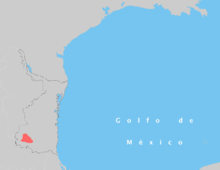Naolan language
| Naolan | |
|---|---|
| Region | NE Mexico |
| Extinct | ca. 1950 |
unclassified | |
| Language codes | |
| ISO 639-3 | None (mis) |
| Glottolog | naol1234 |
 The location of Naolan in Tamaulipas state | |
Naolan is an extinct language that was spoken a five-hour walk away from Tula, Tamaulipas in northeast Mexico. It is only known from 48 words and several phrases collected in the 1940s, and was nearly extinct at that time (Weitlaner 1948).[1]
Classification[]
Naolán has been compared to numerous languages, but none are obviously close and there is not enough data to spot more distant relationships. Six of the words are Spanish loans, five more appear to be loans from neighboring languages, and another four are suspected loans, leaving little to work with. Campbell (1979, 1997) therefore considers it unclassified.
Vocabulary[]
Weitlaner's (1948) word list of Naolan is reproduced below. The words had been collected from multiple informants, who were Román Rochas, Procopio Medrano Silva, Febronio Saenz, María Hernández, and Mariano Saenz.[1]
| Spanish gloss (original) | English gloss (translated) | Naolán |
|---|---|---|
| mi ojo | my eye | mi yuːhu; ma yoho |
| mi oreja | my ear | mi koːl; ma koːl |
| mis 2 orejas | my 2 ears | mi maːkwil; ma kwil |
| muchacho | boy | maː mušilači; mačičilače |
| maíz | maize | masúːná |
| tortilla | tortilla | ma wiːši; ma wiši |
| calabaza de la tierra | ground squash | má sá mò'ːná |
| calabaza de castilla | Cucurbita argyrosperma | ma só ná; ma sóna |
| maguey | maguey | ma namuléa; mamuléa |
| quiote | quiote (agave stalk) | ma kaːso |
| água miel | honey | ma špaːkeː; maškape |
| água | water | mi; míː |
| carne (de venado) | meat (of deer) | ma naːme; manáme |
| león | lion, puma | maː čitun makapal |
| coyote | coyote | ma boːkam; ma boːkan |
| zorra | fox | má'ː-yo |
| venado | deer | ma naːmeːl; el amel |
| conejo | rabbit | ma kuyóam; makuyón; makuyo |
| está una víbora chillando | a rattling snake | gwašnan masiːlam |
| lagartija | lizard | ma naː šiːl; manači; manaketal; malačil |
| araña | spider | granya |
| caballo | horse | ma kayo |
| borrega | sheep (female) | magalena |
| borrego | sheep (male) | ma kaleːna; makanel |
| balido de la borrega | bleet of sheep | sána ƀa wiči |
| cochino | pig | moːlan, moːlam; móːlan |
| gallo | rooster | ma kalayo; makalayo |
| gallina | hen | ma kaːšta; makašte; makasta |
| rata | rat | ma soːče; ma sóče |
| panal | honeycomb | ma tuːpil; tuːpil |
| panal huaricho | type of honeycomb | ma pajam |
| panal de huariche | type of honeycomb | ma paján |
Phrases[]
Naolan phrases from Weitlaner (1948):[1]
| Spanish gloss (original) | English gloss (translated) | Naolán |
|---|---|---|
| Dame un cigarro. | Give me a cigarette. | sata čumaːƀal; saka čumál |
| Dame una tortilla. | Give me a tortilla. | tatačú mawiːši |
| Dame água. | Give me water. | tataču miː; tataču míː |
| Sabes chupar? | Do you know how to suck? | jotas noːkwil; jota nóːkil |
| Sí, sé chupar. | Yes, I know how to suck. | aːjájas noːkwil |
| Sí. | Yes. | aːj'a |
| Qué bonita mujer! | What a beautiful woman! | kwajano kane makwanso |
| Buenos días. | Hello, greetings | nyó'ːke; noike; jomene puteis; jonene puteis |
| Gracias, estoy bien. | Thanks, I am good. | jotuní wáːna |
| (mañana ?) | (tomorrow?) | aja ču (šu) wana |
| Cómo está tu hermana? | How is your sister? | jome tu nigwána |
| Qué pasa? | How is it going? | čopajo; čupájo |
| Mañana me voy allá al picacho. | Tomorrow I will go there to the peak. | kosúsameːuwampa ƀiːtóːya |
| ? | ? | kačumái |
References[]
| Wiktionary has a word list at Appendix:Naolan word list |
- Unclassified languages of North America
- Indigenous languages of Mexico
- Languages extinct in the 1950s
- Extinct languages of North America